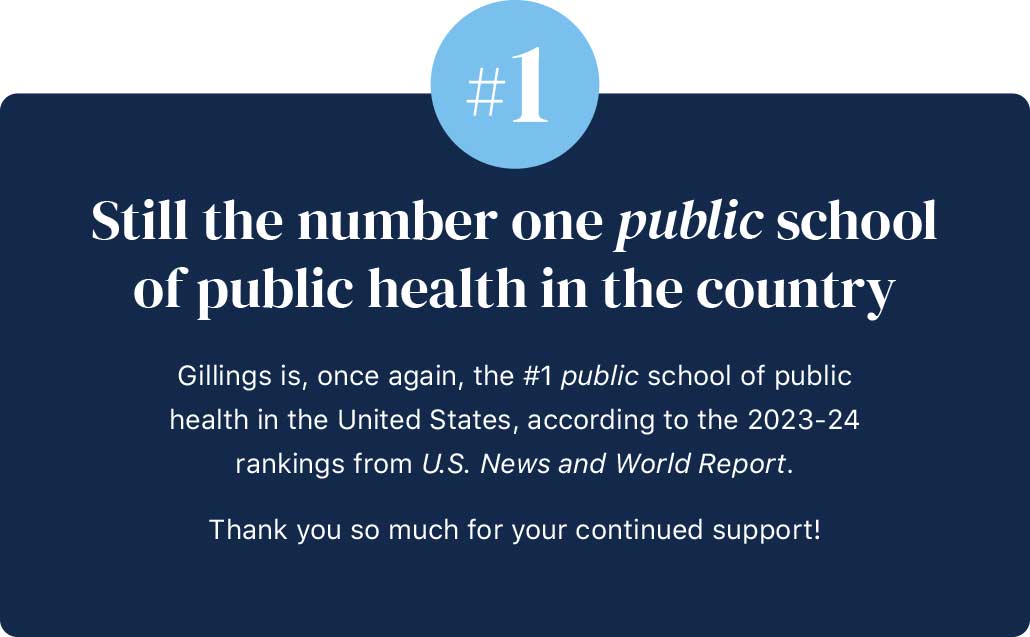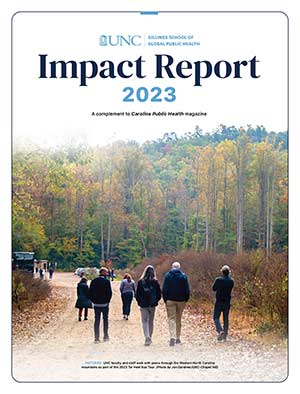Healthy communities: Gillings School plays lead role in new Lancet Commission on Evidence-Based Implementation in Global Health
The Lancet Commission on Evidence-Based Implementation in Global Health, co-led by the Gillings School, aims to enhance global health interventions' practice.
The Lancet has announced a new Commission on Evidence-Based Implementation in Global Health that aims to improve how life-saving and life-enhancing interventions are put into practice around the world, especially in low- and middle-income countries (LMICs). The UNC Gillings School of Global Public Health is playing a leading role in the Commission, serving as its Secretariat.
Advancements in science and technology have led to innovative health solutions that could help achieve the United Nations’ Sustainable Development Goals (SDGs), including the goal of health and well-being for all. But putting these interventions into practice equitably, sustainably and at scale is a huge challenge – one the new Commission strives to overcome through establishing the vision for evidence-based implementation in global health and developing a blueprint for achieving it.
In so doing, the Commission will strive to improve both the generation and the full and effective use of evidence for implementation. One approach the Commission will use is including the perspective of the implementers for whom the evidence is intended, including policymakers, program managers, front-line providers and funders. The Commission will work to ensure that these implementers are involved in the generation and use of the evidence.
The new Commission will be chaired by Herbert Peterson, MD, the William R. Kenan, Jr. Distinguished Professor of maternal and child health and obstetrics and gynecology at UNC-Chapel Hill and director of the World Health Organization (WHO) Collaborating Center for Research Evidence for Sexual and Reproductive Health. His co-chairs are Joy E. Lawn, MBBS, PhD, from the London School of Hygiene and Tropical Medicine and Queen Dube, MBBS, PhD, from the Ministry of Health of Malawi. Joumana Haidar, DBA, deputy director of the WHO Collaborating Center at the Gillings School, will serve as the lead for the Secretariat. The Commission will be supported by an advisory group of experts in global health implementation that will provide input from the perspectives of key stakeholders on the needs for evidence-based implementation, including how best to build and sustain a global movement to meet those needs.
“We have made great progress in using our best science to create life-saving and life-enhancing interventions, and it is now time to do likewise for putting them into practice,” Peterson said.
The Commission’s priorities will include determining the current state of implementation evidence, the evidence that will be most helpful for improved implementation going forward, and how best to generate this evidence and support its full and effective use in practice.
“With this Commission, we have a wonderful opportunity to work toward achieving justice in implementation in global health. We will create a roadmap for building and applying the science needed to ensure that our most promising health innovations reach all those they are intended to serve,” Peterson said.
The Commissioners of the Lancet Commission on Evidence-Based Implementation In Global Health are Hanan F. Abdul Rahim, Niveen M. E. Abu-Rmeileh, Richard M. K. Adanu, Ross C. Brownson, David A. Chambers, Peter Cherutich, Elwyn Chomba, Komatra Chuengsatiansup, Queen Dube, Cyril M Engmann, Dean L. Fixsen, Patricia J. Garcia, Lisa R. Hirschhorn, Joy E. Lawn, Susan Michie, Joanna C. Moullin, Per Nilsen, Sania Nishtar, Obinna Onwujekwe, David Peiris, David H. Peters, Herbert B. Peterson, Stefan S. Peterson, Shankar Prinja, Helen Rees, Barbara K. Rimer, Jo Rycroft-Malone, Peter Waiswa, Judith N. Wasserheit, and Dong Roman Xu.
Learn more about The Lancet’s Commission on Evidence-Based Implementation in Global Health in The Lancet Letter at thelancet.com/journals/lancet/article/PIIS0140-6736(23)00870-X/fulltext
Our 3 pillars for a healthier future
We strive toward a future where health is a universal right and the planet we call home is safeguarded for generations to come. In our pursuit of a healthier world, we’ve established three essential pillars to illustrate how we meet our mission.
- Preparedness: We aim to prevent crises; craft strong, empathetic health messages; support an immediate response to emergencies; and work with communities through their full recovery.
- Clean air and water: We study the systems, structures and pollutants that pose a threat to health, invent scalable solutions, and collaborate with leaders to create sustainable change.
- Healthy families and communities: We research chronic illness prevention, address health inequalities and curb harmful behaviors with population-level strategies.





